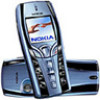Nokia 7250i Nokia 7250i User Guide in English - Page 72
Multimedia messages, Object format not supported, ALLOW MULTIMEDIA RECEPTION
 |
View all Nokia 7250i manuals
Add to My Manuals
Save this manual to your list of manuals |
Page 72 highlights
Menu functions • MULTIMEDIA MESSAGES Note: This feature uses shared memory. See "Shared memory" on page 16 for more information. A multimedia message can contain text, sound, and a picture. Your phone supports multimedia messages that are up to 45 KB. If the maximum size is exceeded, the phone may not be able to receive the message. Depending upon your network, you may receive a message that includes an Internet address where you can go to view the multimedia message. Pictures are scaled to fit the display area of the phone. Your phone has a multimedia message viewer for playing messages and a multimedia inbox for storing saved messages. Once you save the multimedia message, you can use the image as a screen saver or the sound as a ringing tone. Note: This function can be used only if it is supported by your service provider. For availability and a subscription to the multimedia messaging service, contact your service provider. Only compatible devices can receive and display multimedia messages. Note: The default setting of the multimedia message service is on. Multimedia messaging supports the following formats: • Picture: JPEG, GIF, PNG, OTA-BMP, and WBMP • Sound: SP-MIDI and monophonic ringing tones Note: If a received message contains unsupported elements, they may be replaced with the text Object format not supported. Define MMS settings Before you can use the multimedia message feature, you must specify whether you want to receive messages at all times or only if you are in the service provider's home system. ALLOW MULTIMEDIA RECEPTION You can choose to receive all messages or to receive messages only when you are in the service provider's home network. [ 61 ]















